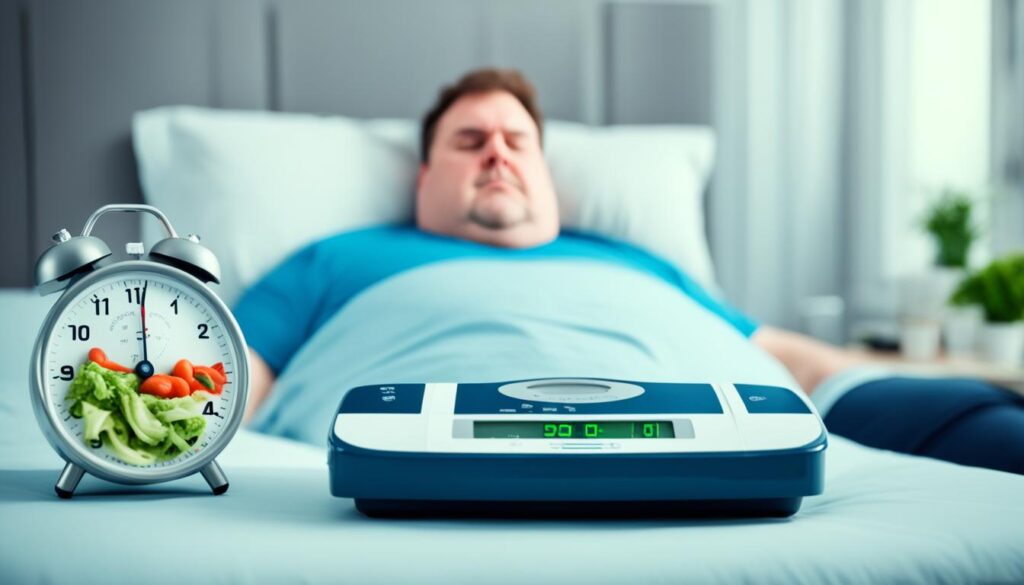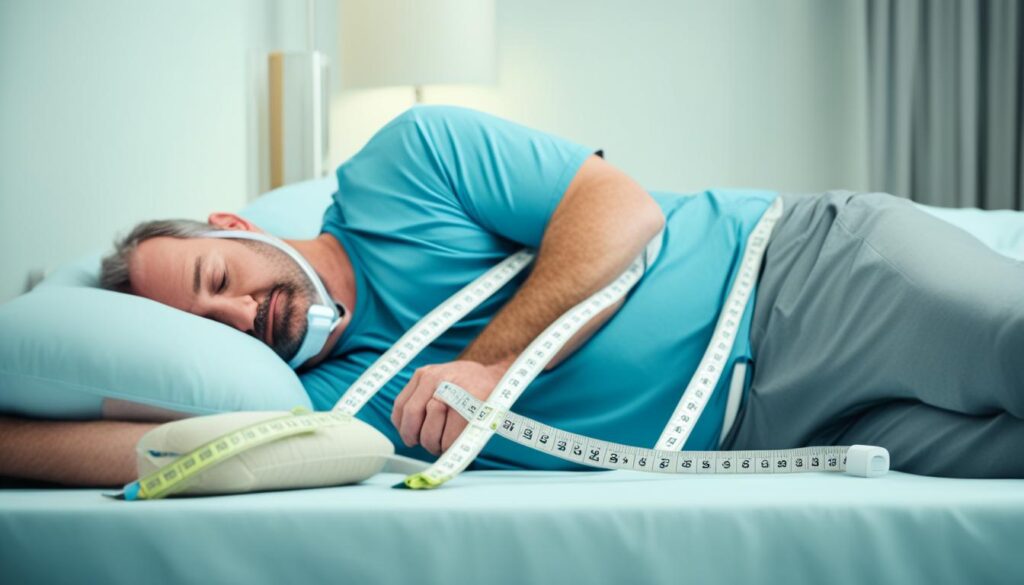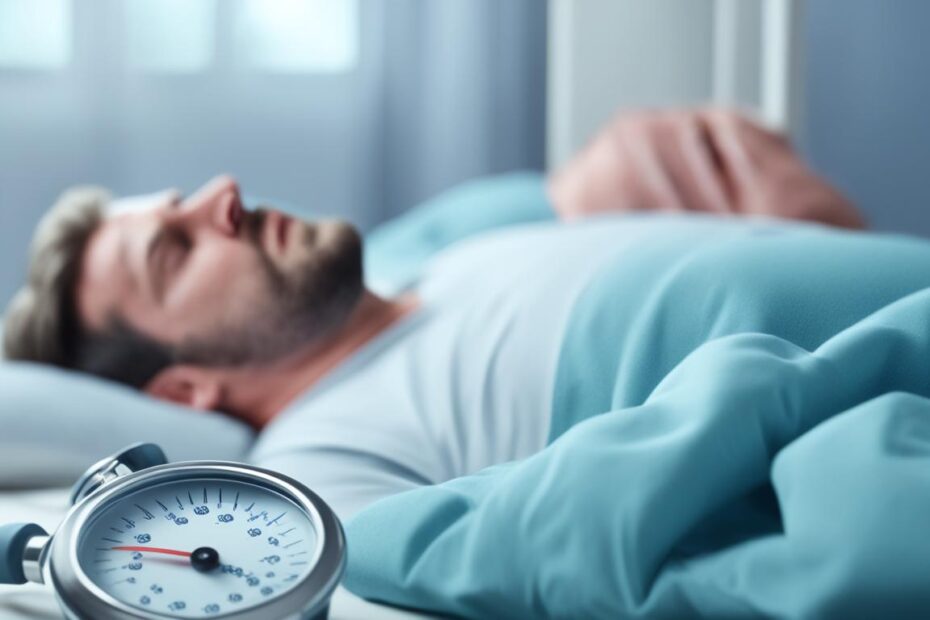I find the connection between weight and sleep apnea really interesting. I’ve battled with these issues myself. Sleep apnea is when your breath stops and starts while you’re sleeping. This can happen more if you’re carrying extra weight. So, it made me wonder: can losing weight improve how we sleep?
Looking into it, I found out that being obese raises your chances of sleep problems. But here’s the good part: dropping just a little weight, like 5-10%, might make it easier to breathe at night. In this piece, I’ll cover the links between weight and sleep apnea. I’ll talk about possible treatments and how to keep your weight in check. Let’s see if shedding pounds really can help with sleep apnea.
Understanding the Link Between Weight and Sleep Apnea
I’ve found a strong link between being overweight and sleep issues. Extra weight can change how we breathe when asleep. This change can lead to sleep problems. Let’s look deeper into how weight can affect our sleep and breathing.
How Excess Weight Affects Breathing During Sleep
Extra weight can be seen in more than our body shape. It’s also in the fat around our necks. This fat makes our upper airways narrow.
As this happens, it’s harder to breathe during sleep. Our chance of getting sleep apnea goes up with a higher body mass index (BMI).

The Role of Pharyngeal Fat in Airway Obstruction
Neck fat is key in causing sleep apnea. It acts like a blockage in our throat. This blockage can stop air from flowing freely.
Without enough air, we can have breaks in breathing while asleep. Adding a little weight can greatly raise our risk – 10% more weight makes you six times more prone to sleep apnea.
Impact of Abdominal Fat on Lung Volume
It’s not just neck fat that’s the issue. Belly fat pushes on our chest, making it harder for our lungs to expand.
When our lungs can’t expand fully, our upper airway can collapse during sleep. This starts a chain reaction that can really mess up our sleep and health.
By understanding these links, we see why most adults with sleep apnea are overweight. It’s obvious that keeping our weight in check is really important for good sleep and health.
The Impact of Weight Loss on Sleep Apnea Symptoms

Losing weight can help a lot with sleep apnea. A study with 180 overweight people found great news. Those who lost just 5% of their weight saw their symptoms improve a lot. But the biggest change came with a 10% weight loss.
Some cool facts support this:
- 84% of sleep apnea diagnoses are obstructive sleep apnea (OSA)
- Obesity is the primary risk factor for developing sleep apnea
- 22 million Americans suffer from sleep apnea
The link between being overweight and sleep apnea is strong. Too much weight can close your, which makes breathing hard during sleep. Losing weight takes the pressure off your airways and can make sleep apnea go away.
But losing weight might not fix everyone’s sleep apnea. How someone’s body reacts can differ. Some may see their sleep apnea go away. Yet, others may still need more help. Always talk to a doctor before making big changes to how you manage sleep apnea.
Can Weight Loss Cure Sleep Apnea?
I’ve looked into how losing weight affects sleep apnea, and I found something interesting. Many people are curious if losing weight can help stop this sleep problem. Let’s look at what studies say about using weight loss to treat obstructive sleep apnea.
Weight Loss for Improvement
Losing as little as 5-10% of your body weight is a big deal. My research shows this weight loss can really help with sleep apnea symptoms. For some, their sleep apnea might even go away.
Research Backing Weight Loss
Many studies say that losing weight can treat sleep apnea. A recent review in 2021 shows that changing your diet and adding exercise are key. This research is encouraging for those who wonder if weight loss can fix sleep apnea.
Individual Results May Vary
Weight loss isn’t a sure fix for everyone, though. How your body reacts can be different from someone else’s. For a few, losing weight might completely solve their sleep apnea. Yet, others might still need more treatment. Talking with your doctor to choose the best options for you is important.
So, weight loss looks really hopeful in treating obstructive sleep apnea. While it may not work for everyone, it could really help many people with this problem.
The Surprising Role of Tongue Fat in Sleep Apnea
I’ve found something big about sleep issues. A study shows losing weight cuts tongue fat, helping treat sleep apnea. This is a big step in fighting this problem.
67 folks with obesity and sleep apnea were in the study. In six months, they lost 10% of their weight. But the real surprise came when their sleep apnea got 30% better. It was because their tongue fat went down.
Now, let’s look at the main points:
- People lost about 20% of their tongue fat.
- Only making the tongue smaller helped with symptoms.
- Other throat muscles getting smaller didn’t change much.
This finding changes how we treat sleep apnea. Experts are exploring ways to reduce tongue fat. They’re thinking about special diets or using cold to remove fat from the tongue.
If you’re dealing with sleep apnea, this is good news. Losing weight, especially from the tongue, might help a lot. It shows losing the right kind of fat is really important.
Strategies for Effective Weight Loss to Improve Sleep Apnea
I’ve found that tackling sleep apnea by losing weight needs many steps. This means you need to do a few things to get to a healthy weight and change your life for better sleep.
Dietary Approaches for Sleep Apnea Patients
A balanced diet is key for losing weight and getting better sleep with sleep apnea. Choose whole foods, fruits, veggies, lean proteins, and whole grains. Women should eat about 1,200-1,500 calories a day. Men should aim for 1,500-1,800 calories. This helps you lose weight slowly, like 1-2 pounds a week.
Exercise Recommendations for Better Sleep and Weight Management
Being active is important for managing your weight and sleeping well. Start with easy exercises like walking or swimming. Then, make it harder and longer as you get better. Try to do 150 minutes of moderate exercise or 75 minutes of hard exercise each week.
Behavioral Therapy and Lifestyle Changes
To sleep better, you need to change some of your habits. Working with a therapist or joining a support group can help. They can give you tips for handling stress and making your sleep better. Small steps, like a set sleep time or a calm bedtime routine, can really help your sleep and weight loss.
Combining Weight Loss with Other Sleep Apnea Treatments
Dealing with sleep apnea means using many ways to help. Losing weight is key, but sometimes it’s not enough alone. Doctors say losing weight and using a CPAP machine together can fight sleep apnea best.
CPAP therapy is the top treatment for sleep apnea. Keep using your CPAP machine as you try to lose weight. A study in 2021 found that using CPAP a lot didn’t make people gain weight. Some with heart problems even got thinner while they used CPAP machine!
There are also other choices, like special pillows or mouth devices. These are good if you can’t use the CPAP machine. The important thing is to team up with your doctor. Together, you can figure out the best ways for you. What helps one person may not help another. So, it’s about finding your right mix of treatments to fight sleep apnea!
